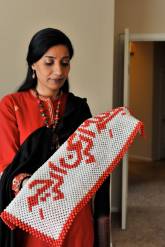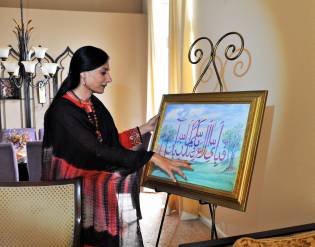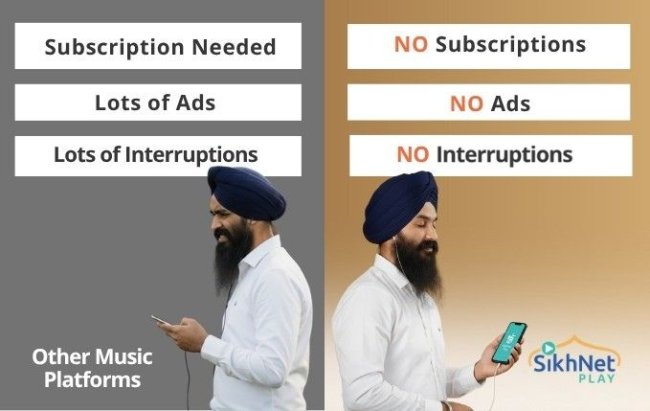Muslims defend religion against terrorism, bigotry
 |
| Kim Palaferri / Special to the Press Tribune When she was 16 in Pakistan, Roseville resident Durriya Syed created a beaded tapestry that reads, “In the name of God, the beneficent, the merciful.” |
He drew from this passage, among others: “We ordained for the Children of Israel that if anyone slew a person – unless it be for murder or for spreading mischief in the land – it would be as if he slew the whole people” (Koran 5:32).
The excerpt has been a hallmark of non-violence in Islam, one that took on particular significance after 9/11.
Far from the Ground Zero attacks and subsequent wars, local Muslims nevertheless feel the paradigm shift that has left them to vindicate their religion. In doing so, many cite the same lines that Obama did, highlighting the sin of murder that renders terrorism anti-Islamic. They address the global events that bring to light anxiety driven by religious interpretation: Will Islamists seize power in Egypt? Does free speech justify Koran burning? Who decides the fate of an Islamic center near Ground Zero?
Roseville is not exactly a hotbed of religious strife. Rather, pockets of discrimination compel Muslims here to confront what they see as a misreading of their faith.
This proactive approach differs sharply from the days of indifference before 9/11, days when Muslims blended in with little thought to outside scrutiny. “We were in our own world,” says Durriya Syed, a Muslim who lives in Roseville.
Overnight, non-Muslims started questioning those among them who appeared different, and Muslims felt the stares. Syed recalls that in 9/11’s aftermath, her son got into a brawl with a classmate who derided him as a terrorist. The Syeds asked administrators not to suspend the other boy: They didn’t want to leave him with a lasting, cynical memory of Muslims.
Tensions, though, complicate more than just the Islamic community. Yousaf Iqbal, one of the few Muslims at Woodcreek High School, says the only moment of prejudice he experienced had nothing to do with him. Years ago, he was playing football with his dad at H. C. Elliott Park, near Junction Boulevard, when they noticed children ganging up on a boy wearing a Sikh turban. The Iqbals intervened, afraid they would not just stop at calling the Indian a terrorist, but turn violent.
“Basically, if you’re brown or from the Middle East, you’re just combined into one,” Iqbal says.
That combination – with overtones of the catch-all label “terrorist” – frequently implicates Sikhs, a group mistaken as Muslims because of their head-wear. Witness the Sacramento attackers who in November shouted anti-Islamic slurs as they beat a Sikh cab driver. Or look to Roseville’s own Sikh Temple on Main Street. Sitting there one afternoon in a lavender turban, Tara Singh describes a day several months ago, when a man squabbling with Singh over a parking space wrote him off as an Arab. Singh remembers the encounter without rancor, but criticizes Muslims who do not address the bad seeds exploiting their religion.
 |
| Kim Palaferri / Special to the Press Tribune Durriya Syed’s father painted for her a watercolor with the words, “Which of the favors of your lord will you deny?” |
But Stephen Neuburger does not view terrorists as such a marginalized group. The retired teacher and nurse suspects that the fraction of extremist sympathizers among Muslims far exceeds what’s admitted. Careful not to frame the debate in “us versus them” terms, Neuburger nevertheless condemns Islam as urging bloodshed for conversion’s sake.
“We would be better off without Islam,“ the Roseville resident says, before clarifying, “We would be better off without the violence of Islam, the politics of Islam.”
In his own city, Neuburger fears the growing Muslim population portends a deliberate will to spread and convert.
Concerns like his fall sharply on the ears of Muslims who cringe that “Islam” and “terrorism” are even uttered in the same breath. They struggle to explain how fanatics perverted their faith as a justification to kill. To explain terrorists, they say, requires not simply pitting Muslims against the rest of the world – as so many Muslims have suffered at the hands of Islamic radicals – but taking into account cultural, social and political motives. In other words, what Neuburger fears is Islamism; what locals practice is Islam.
“Yes, there are people – we are the first to recognize – who use our religion as a crutch for their own means,” says Asim Mahmood, a Roseville resident who is Muslim. “But the religion does not in any way, shape or form endorse terrorist acts.”
Phrases like “Islamic radicals” are unhelpful, Mahmood says. Rhetoric that constantly links extremists with Islam bolsters reductionist thinking that the religion instigates terrorism.
This message – that the actions of a few should not bring down the whole – has not gone entirely unheeded. A pastor and chief of staff at Bayside Church, Bill Clark says his congregation – which can reach 10,000 – does not express distrust toward the Muslim community.
“Most Christian people are certainly willing and able to differentiate between the very awful intentions of terrorists and those who would never conceive of doing such a thing,” Clark says.
What’s more, church-goers gave Bayside senior pastor Ray Johnston a standing ovation when he denounced “International Burn a Koran Day” as un-Christian. A Florida pastor had suggested setting fire to Korans to protest building an Islamic center near Ground Zero.
Ideally, Muslims say, more people will adopt solidarity similar to that voiced by Clark. The vast majority of Muslims abide by peaceful teachings, which is the legacy they hope will win out. Just as history has evolved through periods that tarnished entire sectors of society – from the Jewish to the Japanese, from blacks to Hispanics – perhaps this, too, shall pass.

